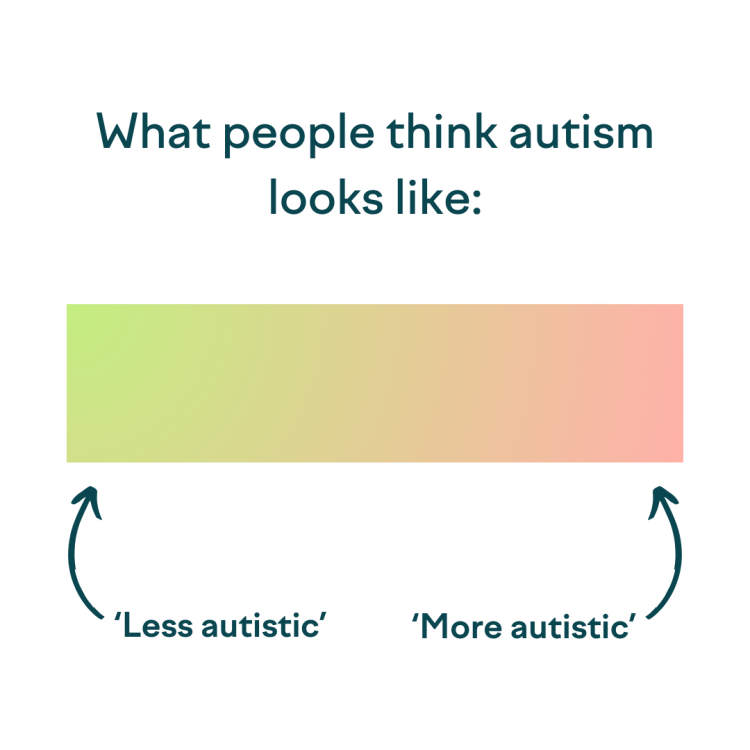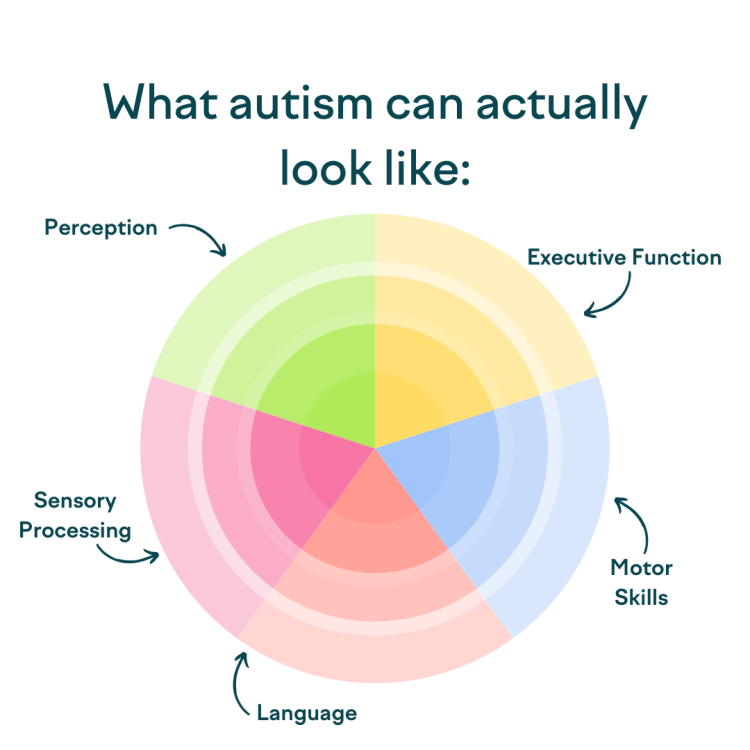Autism spectrum disorder (ASD) is a neurological and developmental disorder that affects how people interact with others, communicate, learn, and behave. It is a processing difference that can have an impact on many areas of a person’s life. Autistic persons often experience differences in how they process information, their sensory environment and how they interact with other people. This is the reason why Autism is called neuro-diversity.
Autism spectrum disorder (ASD) is associated with problem in communication, learning, and behavior, though it can look different from person to person.
Persons with ASD may have a wide range of strengths, abilities, needs, and challenges.
For example, some autistic kids are able to communicate verbally, have a normal or above average IQ, and live independently. Others might not be able to communicate their needs or feelings, may struggle with impairing and harmful behaviors that impact their safety and well-being, and may be dependent on support in all areas of their life.
Additionally, neuro-developmental conditions may also be associated with other health issues that require extra monitoring or treatment. It is important that people who need and desire behavioral supports or interventions to promote communication, social, academic, and daily living skills have access to those services in order to maximize their quality of life and developmental potential.
Causes of Autism
Researchers don’t know the primary causes of ASD, but studies suggest that a person’s genes can act together with aspects of their environment to affect development in ways that lead to ASD. Some factors that are associated with an increased likelihood of developing ASD include:
- Genetics
- Hypoxia during birth
- Premature birth
- Mother’s health(physical and mental health) during pregnancy
- Having a sibling with ASD
- Exposure to heavy chemicals
- Vaccinations
- Having older parents
- Having certain genetic conditions (such as Down syndrome or Fragile X-syndrome)
- Having a very low birth weight
- Exposure to screen during early years
- Having certain genetic conditions (such as Down syndrome or Fragile X syndrome)
Signs of Autism
Symptoms of Autism Spectrum Disorder (ASD) typically become noticeable in early childhood, generally between the ages of 12 to 24 months, although they can manifest earlier or later. Early signs may include significant delays in language development or difficulties in social interaction.
The main symptoms of ASD fall into two main categories:
- Challenges with communication and social interaction
- Engaging in restricted or repetitive behaviors or activities.


Challenges with communication and social interaction
- Autism Spectrum Disorder (ASD) can involve a range of communication challenges, many of which may become apparent before age 5.
- Limited or inconsistent eye contact during conversations.
- Seeming disengaged or not paying attention to people who are speaking.
- Rarely expressing interests, emotions, or enjoyment in objects or activities with others, like not pointing things out or showing them to others.
- Being slow to respond or not responding at all to one's name or verbal attempts to get their attention.
- Struggling with the give-and-take of conversation.
- Frequently talking extensively about a particular topic without noticing others' lack of interest or without allowing others to contribute to the conversation.
- Demonstrating facial expressions, movements, or gestures that don't align with what they're saying.
- Speaking in a peculiar tone, which could sound sing-songy, flat, or robotic.
- Having difficulty understanding others' perspectives or predicting their actions.
- Struggling to adapt their behavior to different social situations.
- Finding it challenging to engage in imaginative play or to make friends.
Engaging in restricted or repetitive behaviors or activities.
Apart from the challenges in communication and social interactions linked with autism, individuals with this condition may also exhibit symptoms related to their body movements and behaviors. These can include:
- Engaging in repetitive movements like rocking, arm flapping etc
- Having a strong preference for arranging objects and becoming upset if that order is disrupted.
- Following strict routines.
- Repeating words or phrases known as echolalia.
- Showing overly focused interests, such as with moving objects or with parts of objects
- Showing unusual reactions to sensory stimuli such as sounds, smells, or tastes, light.
- Developing obsessive interests in particular topics or activities.
- Demonstrating exceptional abilities, such as musical talent or remarkable memory skills.
- Having a lasting intense interest in specific topics, such as numbers, details, or facts
Other characteristics
Some individuals with autism may also experience additional symptoms, which can include:
- Delays in motor skills, language development, or cognitive abilities.
- Occasional seizures.
- Gastrointestinal issues like constipation or diarrhea.
- Experiencing excessive worry or stress.
- Unusual levels of fear, which can be either heightened or reduced compared to typical expectations.
- Displaying hyperactive, inattentive, or impulsive behaviors.
- Demonstrating unexpected emotional reactions to various situations.
- Having unusual eating habits or preferences.
- Experiencing irregular sleep patterns.
- Stimming often involving repetitive motions or speech.
Diagnosis of autism
Although autism can be diagnosed at any age, it is described as a “developmental disorder” because symptoms generally appear in the first 2 years of life.
Currently, one out of every 59 children has been diagnosed with autism spectrum disorder. That means autism is really common. And this is what’s really important — getting help early makes all the difference. There are many specialized screening tools to help identify children with autism. Most of these screening tools are yes-or-no questions or a checklist of symptoms.
Here are few ways to test children for autism:
- How a child laughs
- How a child makes eye contact
- How a child points or waves
- How a child tries to get attention during the conversation
- How a child cries during the appointment
- How a child is meeting all developmental milestones
Supervise your child’s development
When trying to spot signs of autism, you should observe your child’s development carefully. Check if your child is developing social, interactive, and emotional skills at an appropriate rate.
Trust your instincts
If you feel that your child is facing challenges in developmental milestones, be persistent. Only parents know their child better than anyone.
Don’t waste time
If your instincts are telling you something, do not wait. Make an appointment with your doctor. Early intervention with young children with autism is important to future success.
When to consult the doctor
Being a bit late to talk, or being shy, or just being quirky is all more common than autism. But getting help early can make a difference no matter what is going on, so whenever we see something that concerns us, we want to take a closer look. Early diagnosis of autism correlates with better outcomes and positive long-term effects. It helps your child make better progress in their behaviors and other challenges. If your child is showing any unsual symptoms, consult your Doctor and get your child treated.
What are the complications of autism?
Autism spectrum disorder (ASD) can bring about a variety of additional challenges and conditions, both physical and mental. These complications often include:
- Feeding Issues: Many individuals with autism may have selective eating habits, sensory sensitivities related to food textures or tastes, or difficulties with mealtime routines.
- Poor Sleep: Sleep disturbances are common among people with ASD, which can include difficulty falling asleep, frequent night awakenings, or irregular sleep patterns.
- Gastrointestinal (GI) Problems: Digestive issues like constipation, diarrhea, or abdominal pain are reported more frequently in individuals with autism compared to the general population
- Epilepsy: Seizures and epilepsy occur at a higher rate among individuals with ASD, particularly in those with more severe forms of the condition.
- Attention-Deficit/Hyperactivity Disorder (ADHD): ADHD, characterized by difficulties with attention, hyperactivity, and impulsivity, often co-occurs with autism.
- Anxiety and Depression: Mental health challenges such as anxiety disorders (including OCD) and depression are common among individuals with ASD, partly due to difficulties in social interactions and coping with sensory sensitivities.
- Other Mental Health Conditions: Conditions like schizophrenia and bipolar disorder can also occur alongside autism, though less frequently and often presenting unique diagnostic challenges.
Managing these complications requires a comprehensive approach that addresses both the core symptoms of autism and these associated conditions. Early intervention, tailored therapies, and supportive care can significantly improve the quality of life for individuals with ASD and help mitigate the impact of these challenges.
Treatment of Autism
The homeopathic approach in the treatment of autism is holistic in nature, which aims at treating the genetic tendencies along with strategic management. Firstly, a homeopathic evaluation is undertaken for a child with autism, where all details regarding his family medical history, which may be associated with autism, are assessed. The analysis also considers the impaired functions of a child such as his behavior, communication, speech, tantrums and social skills. The homeopathic medicines used for the treatment of autism are completely natural and safe, devoid of any form of harmful toxin. Hence, no side effect is caused on the body while undertaking homeopathic treatment. Using homeopathic measures for about six months will lead to improvements in a child’s autism symptoms. Each prescription is an individualized therapy based on the unique characteristics of the patient, addressing the “whole person” while addressing physical, mental, and emotional symptoms.
Duration of Homeopathic treatment for Autism Spectrum Disorder
This question comes to many parents mind when they are thinking about Homeopathic treatment for their child who is suffering from Autism. There is no fixed duration that can be prescribed as it depends on the severity of Autism, Age of the child, therapies to name a few. So when you are thinking of the duration of Homeopathic treatment for Autism, remember the following points:
- Children under 5 may need 2-3 years of treatment.
- Homeopathic medicines are safe with no known side effects.
- Therapies alongside treatment can enhance outcomes.
- Improvements often persist post-treatment.

